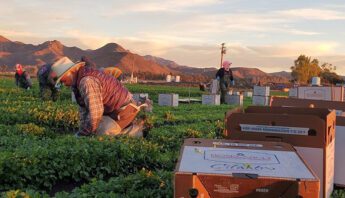Organizations across the country are promoting National Farmworker Awareness Week, (March 25 – 31) and we are inviting our supporters to stand in solidarity with farmworker campaigns across the country. This year, the fight for health and safety protections, improved immigration policies, fair wages, and the right to organize are more important than ever. Farmworkers worldwide are faced with a future of increased risk and uncertainty due to climate change. But there is good news — organized campaigns to build farmworker power and shift policies are gaining traction.
PAN continues to participate in national-level advocacy groups involved with farmworker issues. We provide technical support and put pressure on regulators to restrict the toxic pesticides that place farmworkers in danger of harm due to high exposure levels.
We also stand in solidarity with the grassroots work of farmworkers to pass historic worker protection laws and build advocacy networks at the local level.
Organizing at the state level
With union membership at historically low levels, farmworkers are nevertheless finding strategic ways to organize and fight for needed worker protections — and, with increasing frequency, they’re winning. For the last 85 years, farmworkers have been exempted from federal labor protections that apply to most other industries. Yet over the last decade, farmworkers have won state battles to claw these protections back. Farmworkers have secured the right to overtime pay in Washington, California, Colorado, and Oregon with strong legislative wins. Meanwhile, New York, Minnesota, Maryland, and Hawai’i have at least partially amended the exemption. State policies around wages and worker compensation vary from state to state, with heated campaigns to restore rights ongoing across the country.
Regulatory wins
In December, PAN helped to win reauthorization of the Pesticide Registration Improvement Extension Act (PRIA), which included a number of small but important improvements for farmworkers. Among the group’s many accomplishments was the mandate for bilingual pesticide labels — a long overdue win.
Another success was the requirement that the EPA post information on Integrated Pest Management (IPM) techniques for agriculture on their website. This includes technical assistance for implementing IPM practices. While the agency claims to support IPM, it historically has only done so for pesticide use in schools, while providing no support for IPM in agriculture. This step forward is important in holding EPA accountable for a meaningful reduction in toxic chemical inputs that result in farmworkers being routinely exposed to dangerous pesticides.
The nerve agent fight continues
Organophosphate pesticides have been a priority for farmworker groups over the last year. This class of pesticides (chlorpyrifos, recently banned for food uses, belongs to this class) are acutely neurotoxic and associated with severe neurodevelopmental harm. Farmworkers are routinely exposed to these chemicals in the fields, and those who live close to the fields where they work experience a double dose of this poison.
This outrageous level of exposure is the focus of an ongoing lawsuit against EPA to ban this class of nerve-agent pesticides. Last year, a federal bill was introduced to ban organophosphates (OPs). As this fight continues, we’ll be putting out regular actions for our supporters.
Farmworkers and climate change
This year, PAN released a new report highlighting how climate change impacts will likely lead to increased pesticide use. It’s clear that without a drastic change in course, farmworkers will not only be exposed to dangerous and deadly weather conditions, but they will also have much higher exposure to pesticides. Also, as migration increases under climate change, the call for improved immigration policies — and pressure to end exploitative guest worker programs like H2A — will also increase.
According to the most recent IPCC report, we will likely reach the threshold where it will become very difficult to mitigate the effects of climate change around the year 2030. This next decade will be a time of global reckoning, and farmworkers are poised to lead with wisdom and strategy in this fight. It is clear to us that any action to support the strength of the farmworker movement is a vital part of climate action.
The future of farm work
At PAN, we’re longing for a future where the standard for farmworker well being is more than just gaining the rights already afforded to workers in other industries. Farmworkers deserve fulfillment, self-determination, and the ability to build wealth. They also deserve to be recognized as a highly-skilled workforce full of people with important and underutilized farming experience.
In a moment where the average farmer is almost 60 years old, the next decade will also be one with significant land transfer. Land access and a path to citizenship is part of the fight for justice for farmworkers. We see the seeds of this vision in projects like Cooperative Tierra y Libertad in Washington, where organized workers from the independent union Familias Unidas por la Justicia collectively manage the farm.
The fight for farmworker justice is ongoing, and workers need all the support they can get. You can do something for farmworker justice today by adding your name to the public call for passing the Protect America’s Children from Toxic Pesticides Act (PACTPA), which would reform US pesticide laws and secure protections for farmworkers at the federal level. With strong solidarity at the state, local, and federal level, we can work together to turn the thermostat towards justice.







